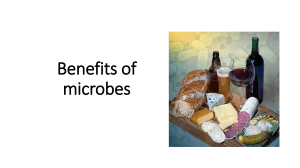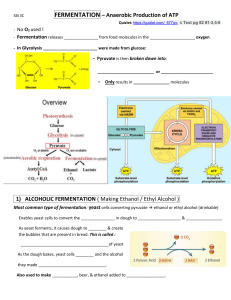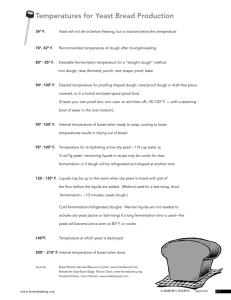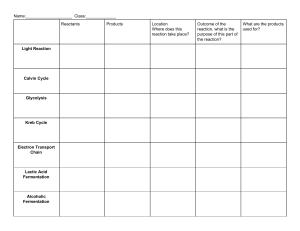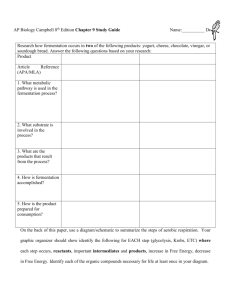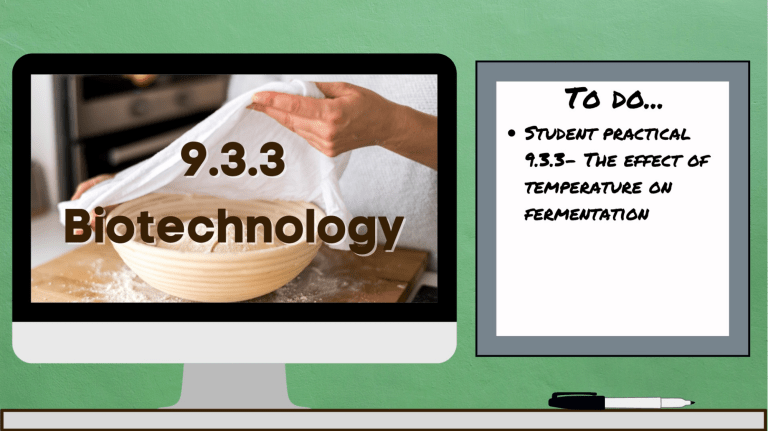
• Student practical 9.3.3- The effect of temperature on fermentation DO THIS NOW… Think about aerobic and anaerobic respiration then answer the questions below. Explain your answers. 1. Which of the two runners is more likely to rely on anaerobic energy and why? 2. How would a runner ensure his body is given a steady supply of oxygen? 3. Does a marathon runner sprint? Learning Objectives Understand some applications of fermentation Success Criteria K- state what is meant by fermentation. name the organism used to make bread, beer, and wine. make observations about the rising of bread dough in an investigation. A- write the word equation for fermentation. describe how bread, beer, and wine are made. carry out an investigation to investigate the effect of temperature on fermentation, recording measurements and drawing a conclusion. E- explain how the process of fermentation works in relation to the word equation. explain why temperature is important in the making of bread, beer, and wine. carry out an investigation to investigate the effect of temperature on fermentation, using results to draw a conclusion, and suggest one way to minimise error. Key terms- biotechnology, fermentation Equipment out, date and title underlined, key terms written down Think, pair, share… What links these foods & drink? This Photo by Unkno wn Author is license d under CC BYNC This Photo by Unknown Author is licensed under CC BY This Photo by Unknown Author is licensed under CC BY New information- biotechnology Many of the foods and drinks we consume have been made using microbes. For example, yeast is added to bread to make it rise. The first recording of this is by Ancient Egyptian bakers in 300BC but it was probably discovered long before this. Biotechnology is the use of biological process or organisms to create useful products. Many of these products are food and drinks. Demonstrate understanding Task: State what is meant by the term biotechnology. The term biotechnology means when we make use of biological processes or organisms to create useful products like foods or drinks. New information- Yeast This Photo by Unknown Author is licensed under CC BYNC-ND Yeast is a microorganism that reproduces and ferments sugar rapidly. It is used in the production of bread and many alcoholic drinks. Can you remember the word equation for fermentation (a type of anaerobic respiration) from last lesson? Glucose à ethanol + carbon dioxide (+energy) The alcohol in wines, beers and spirits. Enzymes present in the yeast speed up fermentation, what temperature do you think they work best at? The gas is trapped as bubbles inside the dough. New information- Baking bread Flour, water, and yeast are mixed to make dough. The dough is then left in a warm place to rise. The carbon dioxide produced during the fermentation is trapped inside the dough, making it rise. The dough is then baked. In the high temperatures of the over, the ethanol evaporates. The bubbles of gas expand, making the bread rise further. Demonstrate understanding Task: Some types of bread are made without using yeast. Suggest and explain how these breads would differ in appearance from bread made with yeast. Bread made without yeast will be flatter in appearance and will not contain air bubbles. This is because fermentation will not have occurred, so carbon dioxide is not made. This means that the bread will not rise. Practical activity- The effect of temperature on fermentation Task: Investigate the effect of increasing temperature on the volume of bread dough. The hypothesis is the amount of carbon dioxide produced depends on the temperature. For this investigation what is the• Independent variable? Temperature • Dependent variable? Volume of dough How can you ensure it is a fair test? (control variable) Design a suitable results table to record your data. Include columns for the time (in minutes) and for the volume (in cm3) of the bread dough. Think, pair, share… How are beer and wine made? New information- Brewing Beer and wine are made in very similar ways. When they are being made, air is kept out of the juice mixture to make sure it ferments. The type of alcoholic drink produced depends on the source of the sugar. This determines the type of ethanol produced. Wine is made when yeast is used to ferment grape sugar. This is known as brewing Beer or lager is made when yeast is used to ferment sugar in malted barley. New information- Brewing Plant sugar is added to a large container- often the plant needs to be crushed. Yeast is added to ferment the sugar into alcohol. The container is sealed to keep out oxygen and other microbes. The mixture is left until the sugar has fermented into alcohol. Sediment is removed from the liquid, often by filtration. The liquid is bottled or put into barrels, ready for use. Demonstrate understanding Task: Cider is an alcoholic drink Apples are squeezed/crushed (to made releasefrom the apples. Explain how The cider could be produced. juice). Yeast is added. container with the juice and yeast is sealed. This keeps out oxygen and microorganisms. Yeast ferments the sugar in the apple juice. The mixture is left until the sugar has fermented into alcohol/cider. Sediment is removed from the liquid (by filtration). The liquid is bottled or put into barrels. Review and reflect Review: Write down… things you have learned today things you would like to learn more about question you have Reflect: How do you feel about today’s learning? Which objective did you reach? What skills do you do well? What could you do to reach the next objective? How could you strengthen your learning at home? Make a note of any area you need to improve… Aiming for… K- state what is meant by fermentation. name the organism used to make bread, beer, and wine. make observations about the rising of bread dough in an investigation. A- write the word equation for fermentation. describe how bread, beer, and wine are made. carry out an investigation to investigate the effect of temperature on fermentation, recording measurements and drawing a conclusion. E- explain how the process of fermentation works in relation to the word equation. explain why temperature is important in the making of bread, beer, and wine. carry out an investigation to investigate the effect of temperature on fermentation, using results to draw a conclusion, and suggest one way to minimise error.
